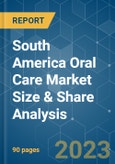Toothpaste remains the largest shareholder in the South American oral care market, owing to the number of variants available and the growing preferences for natural, organic, vegan, and herbal toothpaste. Brazil leads the market in the region, attributed to high-level hygiene practices followed by Brazilians. It was found that 66% of the Brazilian population brushes their teeth three times a day, whereas the global average is only 9%. Moreover, the volume of toothpaste used by the Brazilian people is five times higher than the number of brushes in the country.
Various government initiatives are also playing a big role in raising awareness among consumers about oral health and hygiene. For instance, every year, on the 20th of March, World Oral Health Day is celebrated. The theme for the year 2021-23 is “Be Proud of Your Mouth.” In this campaign, the FDI World Dental Federation focused on raising awareness among consumers about the importance of oral health in all stages of life. The market for oral care is significantly impacted by the rise in dental disease prevalence brought on by an aging population. Tooth decay has increased as a result of poor oral hygiene practices and unhealthy eating habits. This has increased the need for dental caries prevention-focused oral care solutions. When the value of consulting a dentist while selecting oral care products rises, so does consumer demand.
South America Oral Care Market Trends
Increased Demand for New and Innovative Oral Care Products
Various healthcare professionals in the country suggest using oral care products that are natural or organic. Demand for natural and organic oral care products is growing, owing to the side effects of using chemical-rich toothpaste. Awareness among consumers about the use of toothpaste with chemical ingredients in them is leading the market players to use organic and natural sources. Market players are focused on developing new and innovative oral care products with the help of research and development (R&D). Consumers across South America are highly conscious of their oral health. Key players in the sensitivity or pain relief Toothpaste and mouthwash market, such as GlaxoSmithKline Brasil Ltd, are focusing on bringing new products to the retail shelves and are considering investing in offering innovative packaging with eco-friendly options in the related market with interesting innovations like authentic, traditional, enrichment and attractive packaging, thus contributing toward the market demand backed by market growth. Moreover, markets such as Colombia, Nicaragua, Peru, Uruguay, Paraguay, and Costa Rica have been showing a significant increase in value in the rest of the Latin American market.Brazil Dominates the Regional Market
Many manufacturers are attracted to the overall market and strategically plan business expansions and partner with small manufacturers to increase market penetration by strengthening product distribution. Corporate giants such as Colgate-Palmolive Company, Procter & Gamble Company, etc., introduced many innovative products that helped prevent COVID-19 and other competitive supplementary goods last year. Moreover, key players are heavily investing in research and development (R&D) and are working to introduce technologically advanced oral care products, such as electric toothbrushes.Brazilians were more susceptible to halitosis as a result of prolonged mandated mask use during the pandemic, which prompted consumers, especially those in higher socioeconomic levels, to examine their hygiene and self-care practices and adopt a wider selection of oral hygiene products. For instance, sales of oral care products in Brazil reached around BRL 11.5 billion in 2021 when compared to 2020. Through the National Oral Health Policy, the Brazilian Unified Health System (SUS), which is guided by the doctrinal concepts of universal access, comprehensiveness, and equality of care, provides free dental care to Brazilians of all ages (NOHP). The Smiling Brazil policy aims to ensure that Brazilians have access to an oral healthcare network for the promotion, prevention, and restoration of oral health. Family health units (FHU), health units, and mobile dental units (MDU) provide primary care; CEOs (network of specialized Dental Specialties Centers) provide secondary care; and hospitals provide tertiary care. These policies drive the Brazilian oral care market.
South America Oral Care Industry Overview
The South American oral care market is highly consolidated and is driven by the presence of global companies such as Procter & Gamble, Colgate-Palmolive Company, and Unilever. Manufacturers are investing in launching technologically advanced oral care products in the region. For instance, in 2021, companies like Colgate-Palmolive and Philips used a co-branding strategy to enter South American markets. Many other companies are shifting from traditional manufacturing to sustainable, eco-friendly manufacturing and innovation.Additional Benefits:
- The market estimate (ME) sheet in Excel format
- 3 months of analyst support
Table of Contents
Companies Mentioned (Partial List)
A selection of companies mentioned in this report includes, but is not limited to:
- Unilever
- GlaxoSmithKline PLC
- Henkel AG & Co. KGaA
- Procter & Gamble
- Sunstar Suisse SA
- Johnson & Johnson
- Dentek Oral Care Inc.
- Dennis Group
- Industrias Condo
- Intradevco Industrial SA
- Etekcity










